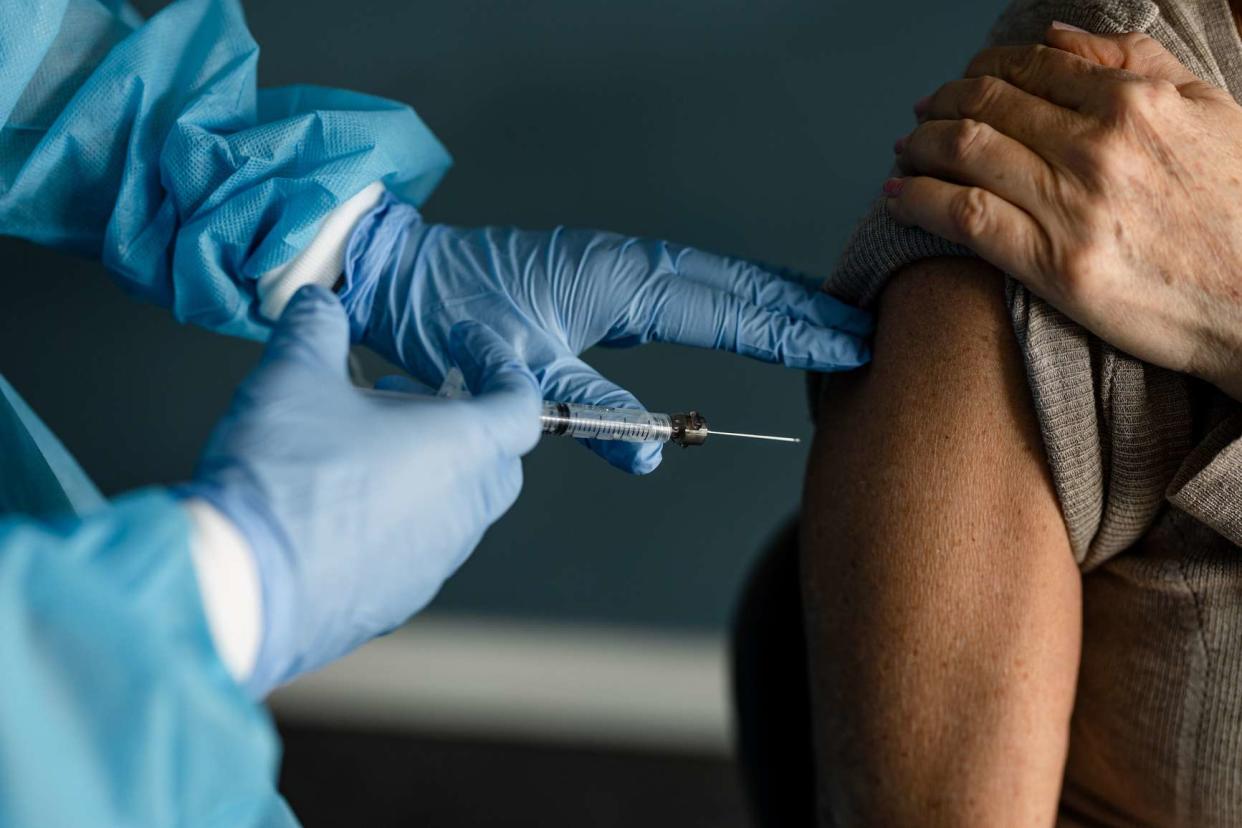FDA Approves First-Ever RSV Vaccine for Adults 60 and Older

McKinsey Jordan/Stocksy
Fact checked by Nick Blackmer
The FDA approved Arexvy, the world’s first vaccine for RSV, on Wednesday.
Manufactured by GlaxoSmithKline Pharmaceuticals, the RSV vaccine is approved for use in people ages 60 and older.
RSV is a common respiratory virus that typically causes cold-like symptoms, but can be serious for some, including older people and infants.
The U.S. Food and Drug Administration has approved the first-ever vaccine for respiratory syncytial virus (RSV), the organization announced Wednesday.
The vaccine—manufactured by GlaxoSmithKline Pharmaceuticals under the name Arexvy—is approved for use in people ages 60 and older. It’s meant to prevent lower respiratory tract disease caused by RSV, which can lead to swelling in the lungs or pneumonia that can be severe.
“Older adults, in particular those with underlying health conditions, such as heart or lung disease or weakened immune systems, are at high risk for severe disease caused by RSV,” Peter Marks, MD, PhD, director of the FDA’s Center for Biologics Evaluation and Research, said in a press release. “Today’s approval of the first RSV vaccine is an important public health achievement to prevent a disease which can be life-threatening.”
GlaxoSmithKline said it’s planning on making the vaccine available to those it’s intended for before the 2023–2024 RSV season, which typically starts in October.
Though Arexvy is the first RSV vaccine to gain FDA approval, it’s likely that additional shots will soon be available.
Pfizer is currently developing an RSV vaccine for pregnant people in order to protect children from the virus, which could be approved as early as this summer. AstraZeneca‘s nirsevimab—not a vaccine but a long-acting monoclonal antibody that protects infants from RSV—is currently under FDA review.
Related:What Is a Respiratory Syncytial Virus (RSV) Infection?

McKinsey Jordan/Stocksy
A Potentially Lifesaving Vaccine for a Common Virus
RSV is a fairly common virus, and for most people who get infected, it causes mild cold-like symptoms. In fact, most children get infected with RSV by the time they turn 2 years old, and the overwhelming majority recover without medical attention.
However, for people with weakened immune systems—particularly infants and older adults—RSV infections can sometimes turn serious.
If people aren’t able to fight off the virus, they may develop bronchiolitis, an infection of the lungs’ airways, or pneumonia. RSV can also worsen pre-existing health issues, such as asthma or symptoms from congestive heart failure. These complications can send people to the hospital, and are sometimes fatal.
The Centers for Disease Control and Prevention (CDC) estimate that annually, between 58,000 and 80,000 kids under five are hospitalized with RSV. Between 60,000 and 160,000 seniors are hospitalized annually, and 6,000 to 10,000 die from the infection each year.
The illness hit the U.S. particularly hard last year—RSV was a contributing factor to the so-called “tripledemic,” which also included a sharp rise in cases of COVID-19 and the flu. Although children were the primary population affected by RSV during the 2022–2023 season, older Americans also felt the impact, with higher-than-usual numbers being hospitalized from the illness.
Until now, the primary prevention methods for RSV included washing hands regularly and often, avoiding close contact with others, and thoroughly cleaning and sanitizing frequently-touched surfaces.
Despite the approval of a new vaccine, there’s currently no specific treatment for RSV—those with the virus mainly rely on symptom management through fever-reducing medication and fluid intake.
If a person’s illness becomes severe, hospitalization may be necessary, where patients can be given supportive care such as additional oxygen, intravenous fluids, or intubation. The new vaccine, however, is intended to prevent RSV infections from progressing to those later, more severe stages.
Related:Pfizer’s RSV Vaccine, Given During Pregnancy, Could Be Available As Early As This Summer
New RSV Vaccine Shows Promise in Clinical Study
The approval of GSK’s RSV vaccine for adults is based on a randomized, placebo-controlled clinical study that’s still ongoing. It includes about 12,500 adults over age 60 that have received the one dose of the Arexvy vaccine, and an additional 12,500 who’ve received a placebo.
The FDA’s approval comes from data from the most recent RSV season, though participants will remain enrolled in the study through three disease seasons so researchers can get a better idea of long term efficacy and safety.
Those who received the RSV vaccine in the trial saw an 82.6% reduced risk of RSV-associated lower respiratory tract disease and a 94.1% reduced risk of RSV-associated severe lower respiratory tract disease.
“With this vaccine, Americans over the age of 60, and particularly those with underlying health conditions like COPD, asthma, or congestive heart failure, will have a vaccine to help protect against potentially serious outcomes from RSV,” John Kennedy, MD, president of the American Medical Group Association, said in a GSK press release.
Despite the promising results of the clinical study, there are a couple of possible side effects that regulators are keeping an eye on. After the shot, some participants reported injection site pain, fatigue, muscle pain, and headache and joint pain.
Additionally, in two smaller studies of adults over 60 who got the shot, one person developed Guillain-Barré syndrome, a rare disorder that damages muscles and nerve cells. Two others got acute disseminated encephalomyelitis (ADEM)—inflammation in the brain and spinal cord—after receiving the Arexvy shot concomitantly with an FDA-approved flu vaccine. One of those participants died.
Because of this, the FDA is asking GSK to assess possible signs of Guillain-Barré and ADEM in postmarketing trials, or studies conducted after FDA approval. The company will also look for possible risks of atrial fibrillation associated with the shot, as well.
In June, the CDC’s Advisory Committee on Immunization Practices will make further recommendations about appropriate use of Arexvy, GSK added, though the company is hoping to make the shot available before the 2023–2024 RSV season begins this fall.
For more Health news, make sure to sign up for our newsletter!
Read the original article on Health.

